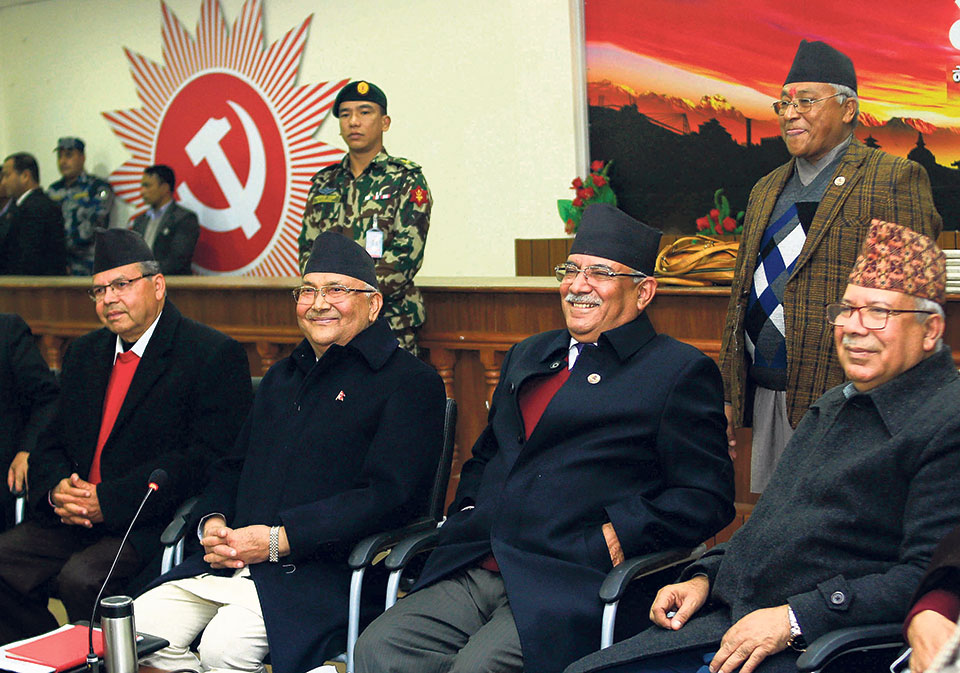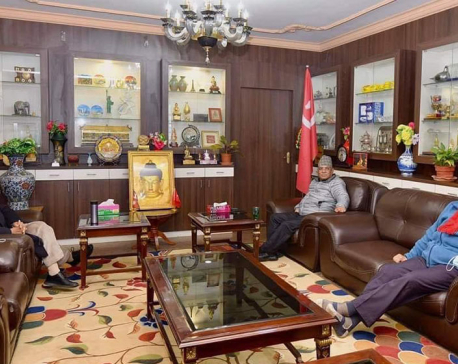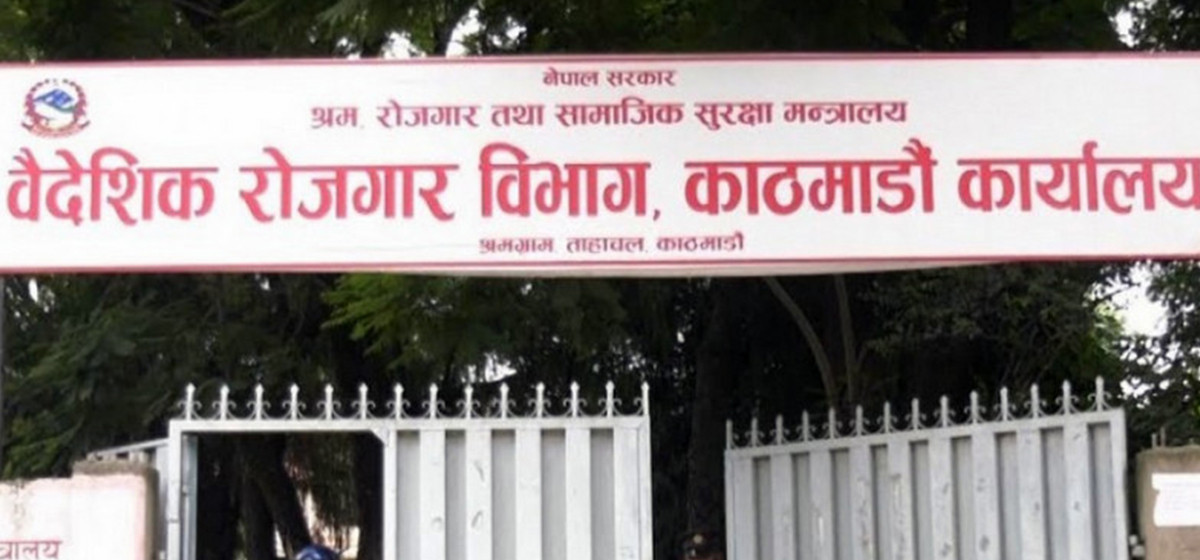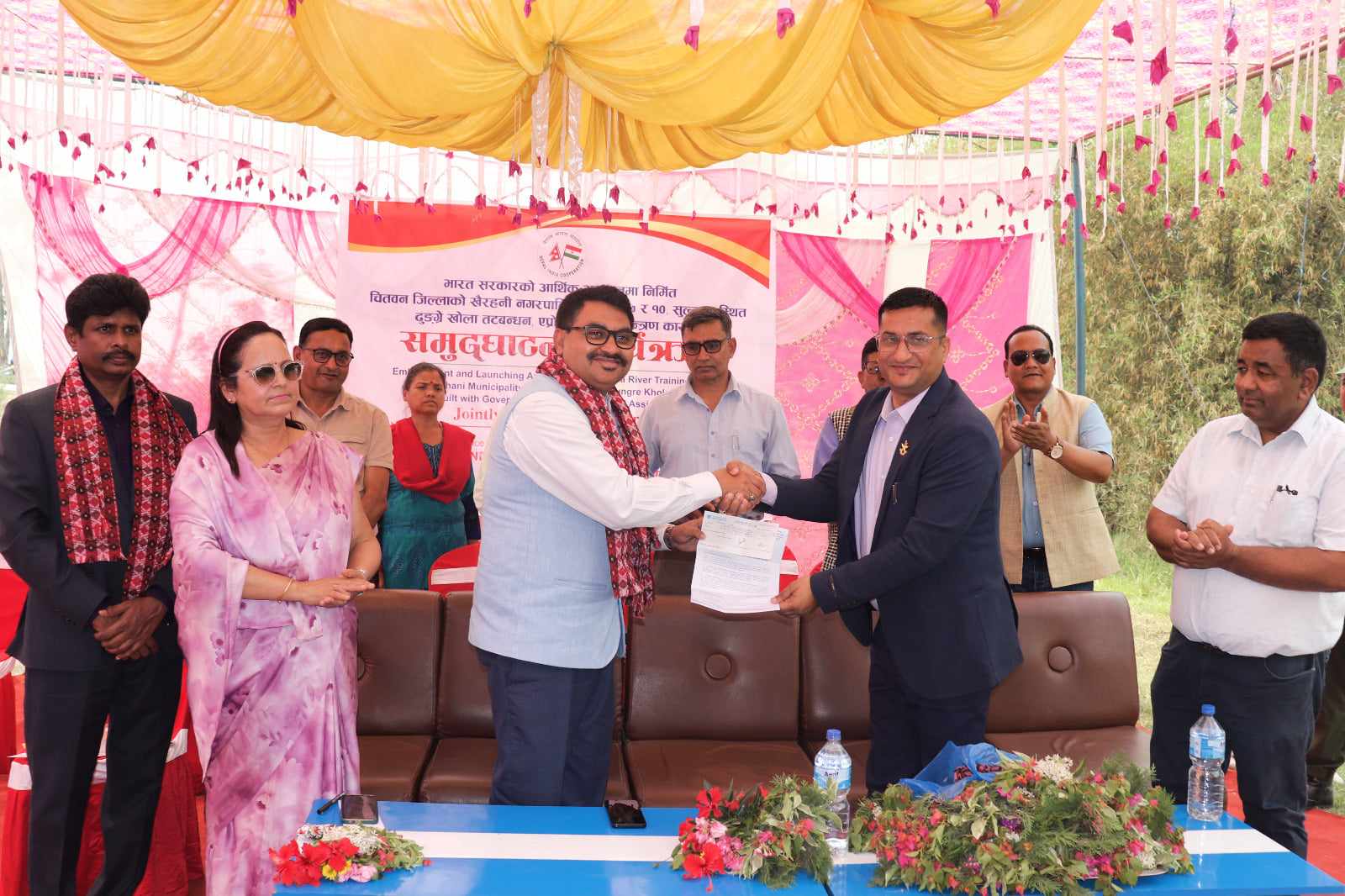
OR
Ruling party leaders continue war of words over leadership
Published On: December 19, 2018 06:30 AM NPT By: Republica | @RepublicaNepal

Demand investigation into activities of Universal Peace Federation and its funding
KATMANDU, Dec 19: Leaders of the ruling Nepal Communist Party (NCP) have engaged in a war of words regarding the government's performance and a lethargic pace of party unification.
Speaking at the ongoing Standing Committee meeting of the party, disgruntled party leaders criticized the working style of party Chairman KP Sharma Oli, who also heads the government.
Arguing that Oli has failed to live up to people's expectations and was instead inviting one controversy after another, they accused him of promoting nepotism and factionalism in the party, thereby affecting the party unification process.
Those supporting the government, however, defended the government and the party leadership, pointing out that the leadership is doing their best despite the multiple challenges ahead.
“Certain leaders are overburdened because of multiple responsibilities while others are deprived of even a single responsibility, and this is because of nepotism in the party,” said Yogesh Bhattarai, “It is the ex- UMLs who are facing this discrimination the most.”
The two dominant communist parties-Communist Party of Nepal (Unified Marxist Leninist) and Communist Party of Nepal (Maoist Center)-- merged to form the NCP ahead of the 2017 parliamentary elections. As of now, the party unification process remains incomplete.
Alleging that the unification process remains stalled because of a group of ex-UML leaders, Bhattarai said conspiracies are still afoot whom to sideline from the party and whom to give a lift to. “If the party unification is delayed just to prioritize factionalism the party will become diminished before the factionalism goals are realized,” he said.
Bhattarai said the party leaders are on a mission to end the political careers of their opponents. “You may sideline certain leaders but their spirits will not stop haunting you and you will not sleep in peace,” he said.
Shortly after Bhattarai upbraided the party leadership in a written statement, Shankar Pokharel, who is considered close to Oli, said he was ready to give up his position as chief minister if anyone felt deprived of responsibilities. “If there is a problem because of me I am ready to step down as chief minister but I will not abandon my political responsibilities,” he said.
Pokharel has been named the party's Province 5 in-charge, in addition to his post as provincial government chief.
Prithivi Subba Gurung, who is also a party in-charge as well as chief minister of Province 4, likewise defended the government, arguing that it was gradually getting on top of the challenges. Somnath Pyasi, Satya Narayan Mandal and Keshav Badal among others also defended the government and the party leadership.
Disagreeing with the government's recent decision to organize the international conference of the controversial Universal Peace Federation, Standing Committee member Bhim Rawal demanded a probe into the UPF and its financial resources. The conference was organized in Kathmandu recently, sparking controversy.
“It should be investigated whether or not the activities of the UPF and its sources of income are in keeping with the law,” Rawal said.
He said the government made a serious blunder in placing the prime minister's signature on the invitation card as co-organizer, naming Eknath Dhakal and the prime minister's foreign affairs adviser as special envoys and using the logo of the government and parliament for a conference organized by an INGO.
He also said the government's decision to deploy a deputy prime minister to receive the conference delegates, the prime minister's stay at a hotel during the conference, and receiving the UPF award without an official government decision were against the spirit of the constitution, the party's own principles, diplomatic protocol and the conduct of a responsive government.
You May Like This

Oli in Khumaltar to meet Dahal
KATHMANDU, Dec 19: The Prime Minister KP Sharma Oli has reached Khumaltar to meet Nepal Communist Party’s Chairman Puspha Kamal... Read More...

NCP to launch prosperity campaign: Chairman Dahal
CHITWAN, Dec 20: Chairman of the ruling Nepal Communist Party (NCP) Pushpa Kamal Dahal has said the standing committee (SC) meeting... Read More...

NCP Secretariat Meeting fixes Standing Committee meeting agenda
KATHMANDU, Dec 15: The Secretariat Meeting of the ruling Nepal Communist Party (NCP) today determined the main agenda for the... Read More...




Just In
- SC rejects writ petition filed against Home Minister Lamichhane
- Nepal and China sign two agreements in the presence of Finance Minister Pun
- Pun released on bail in Supreme Cooperative fraud case
- Govt should not look for enforcing populist budget for next FY: Former finance ministers
- DoFE requests relevant parties to provide essential facilities to foreign workers traveling abroad
- Foundation stone laid for building a school in Darchula with Indian financial assistance
- 151 projects to be showcased for FDI in Third Investment Summit
- Police disclose identity of seven individuals arrested with almost 2 kg gold and more than Rs 10 million in cash















Leave A Comment